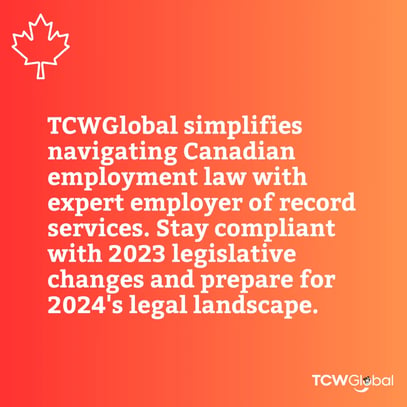CANADIAN WORKPLACE LAW: 2023 Reflections and 2024 Projections: New Key Insights for Companies

November 28, 2023

Canadian Employment Law: Key Changes from 2023 and Preparing for 2024 What Every Company Should Know
Canada celebrated for its stunning natural vistas and vibrant multicultural fabric, stands as an enticing prospect for businesses eyeing international expansion.
Yet, the complexities of Canadian employment law present a unique challenge. Let's shed some light on the crucial aspects of current Canadian employment legislation and provide some actionable advice for minimizing compliance risks.
What You Need to Know About Hiring in Canada
Navigating Canadian employment law in 2023 and beyond presents a multifaceted challenge for employers, with numerous legislative changes and emerging trends to consider.
RECENT LEGISLATIVE CHANGES
Amendments for Federally Regulated Operations
As of July 9, 2023, significant amendments to the Canada Labor Code came into effect, impacting various aspects of employment for federally regulated companies:
Reimbursement of Work-Related Expenses
Federally regulated companies are now required to reimburse reasonable work-related expenses, with specific guidelines to determine the eligibility of these expenses.Provision of Employment Materials
There's an obligation for federally regulated companies to provide materials outlining company and worker rights under Part III of the Code. These materials must be distributed to current workers within 90 days of July 9, 2023, or when first made available by the Ministry, and to new workers within 30 days of their start date.
Written Statements on Employment Terms
Federally regulated companies must furnish a written statement to workers within the first 30 days of employment, detailing job title, wages, and other terms. Any changes to these terms require an updated statement within 30 days.
Administrative Monetary Penalties
Amendments to the Administrative Monetary Penalties (AMP) Regulation establish financial penalties for non-compliance with these requirements.
Provincial Updates
- Ontario: Employers with 25 or more employees have been required to have a policy on disconnecting from work since June 2, 2022, and a policy on the electronic monitoring of workers since October 11, 2022.\
- Quebec: Bill 96 and Bill 64 brought changes in the French language requirements and the protection of personal information, respectively. Under Bill 96, businesses with 25 or more workers based outside of Quebec must provide their customers in Quebec with a French translation of the business-related documents that is of the same quality as English language content and communications they produce no later than June 1, 2025. Larger organizations must comply with these regulations now.
- British Columbia: The BC Pay Transparency Act became effective May 11, 2023. The Act included a prohibition against asking applicants their pay history and included reporting requirements for certain businesses. Further, as of November 1, 2023, salary or wage information must be published in publicly advertised job postings.
As clarified by the Pay Transparency Regulation, there are additional reporting requirements for businesses with 1,000 or more workers as of January 1, 2024, which include making reasonable efforts to collect information on a worker’s gender identity and the establishment of certain reference categories.

TRENDS AND CASE LAW
Constructive Dismissal
A ruling by the Alberta Court of Appeal underscored the importance of timely action by workers when claiming constructive dismissal, highlighting the need for companies to be cautious about unilateral changes to employment terms.
Competition Act Amendments
Amendments to the Competition Act introduced prohibitions on wage-fixing and no-poach agreements, reflecting a shift towards more stringent regulation of employment practices.
FUTURE OUTLOOK
Looking to the coming year and the future, several trends are expected to shape the Canadian employment law landscape:
- Challenges around remote and hybrid work models, particularly in terms of culture, productivity, and flexibility.
- Continued litigation around termination clauses in employment agreements.
- Focus on respectful workplaces, with an emphasis on addressing worker misconduct complaints.
- Vigilance is required for Quebec companies regarding French language compliance matters and the power of the labor tribunal to reinstate dismissed workers.
- More case law is anticipated on notice periods and constructive dismissal due to increased restructuring.
- Additional provinces with pay transparency and/or privacy requirements.
Companies operating in Canada must stay informed and adaptable, as employment and labor laws continue to evolve, reflecting the dynamic nature of the modern workplace.
Final Thoughts
Navigating the complexities of Canadian employment law, especially with its recent changes and diverse provincial regulations, can be a daunting task for companies planning to expand into Canada or manage a contingent workforce there. TCWGlobal, with its award-winning expertise as a global employer of record, is equipped to assist you now.
Our dedicated compliance and legal team is ready to offer tailored support, ensuring your business's smooth transition and adherence to Canadian employment regulations. Explore our solutions and learn more at TCWGlobal.com.
